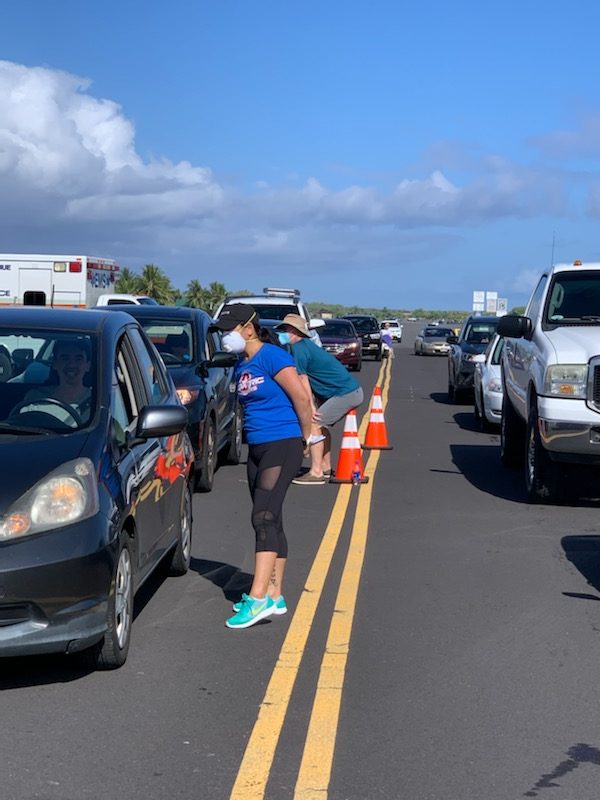Local health care leaders agree COVID-19 pandemic at transition point
The World Health Organization determined the COVID-19 pandemic is approaching a transition point — and President Joe Biden informed Congress on Monday that he will end the twin national emergencies for addressing COVID-19 on May 11.
But for Hawaiʻi County, Mayor Mitch Roth said all county emergency proclamations related to COVID were dropped several months ago.
“We have already transitioned out of the pandemic response,” Roth said.
From March 2020, when COVID-19 was declared a global pandemic, through Jan. 25, 2023, the Hawai‘i Department of Health recorded 376,977 infections for the state, with an unknown number of infections not reported. xx people were reported to have died from the virus.
On the Big Island, the number of reported infections through the same time period is 42,122 with 224 deaths. Click here for statewide COVID-19 data.
While the pandemic response may be over, COVID-19 still is circulating on Hawaiʻi Island and throughout the state, although at low levels, according to local hospital and Department of Health data.

At the present, there are no COVID-19 outbreaks at either of the Big island’s two largest hospitals — Hilo Medical Center and Kona Community Hospital.
“We saw a minimal increase in local COVID activity in the first half of January after the holidays,” Hilo Medical Center spokesperson Elena Cabatu said.
The medical center currently has five patients being treated for the virus. It has not had any recent COVID-19 related deaths.
“The vast majority of COVID infections are found to be incidental cases with another primary reason for hospitalization,” Cabatu said. “It is very rare for COVID patients to end up in the ICU.”
At Kona Community Hospital, there were two COVID-related deaths in January. As of Jan. 29, Anne Padilla, the hospital spokesperson, said the Kona hospital was only treating one patient for the virus, but had been averaging between two to four COVID patients daily.
“Our Emergency Department lately has been dealing with capacity issues, COVID is not the issue,” Padilla said. “What we are seeing is partially the culmination of deferred healthcare in our community as a result of the pandemic.”
Because people have put off getting medical attention, their ailments are ultimately more severe which requires longer hospitalizations, Padilla said.
Hilo Medical Center spokesperson Elena Cabatu said the best way for the state to transition out of the pandemic is to have sound public health policy and educational outreach by the Health Department and the Center for Disease Control and Prevention.
The Big Island’s two largest hospitals currently follow the CDC’s COVID-19 recommendations.
The CDC guidelines include isolation of five days after testing positive for COVID-19. Isolation can end depending on how serious the symptoms are. Click here for all CDC COVID-19 guidelines.
“The World Health Organization’s temporary recommendations appear to be logical and based on public health,” said Hilo Medical Center spokesperson Elena Cabatu.
Those recommendations include:
- Maintain momentum for COVID-19 vaccination to achieve 100% coverage of high-priority groups
- Improve reporting of SARS-CoV-2 surveillance data to the World Health Organization
- Increase uptake and ensure long-term availability of medical countermeasures
- Maintain strong national response capacity and prepare for future events
- Continue working with communities and their leaders to address the infodemic and to effectively implement risk-based public health and social measures
- Continue to adjust any remaining international travel-related measures
- Continue to support research for improved vaccines that reduce transmission
Vaccinations remain one of the best ways to stop the spread of the virus and provide better outcomes for people who get the virus. Cabatu said the hospital screens, recommends and offers patients vaccination when they come in for care.
Roth said the county is still handing out at-home COVID test kits. The county website provides information on where people can get tested and obtain a vaccine.
Kona Community Hospital leaders also agree that the pandemic is transitioning, but COVID is still a global problem.
“There continue to be millions of COVID cases worldwide, and many countries are experiencing a shortage of vaccine,” said Judy Donovan, marketing and strategic planning director for Kona Community Hospital. “We monitor CDC data daily in order to understand mainland trends because those have the potential to impact Hawai‘i.”
Donovan said the hospital encourages everyone to take personal responsibility of their health. Wear a mask if they feel they need to. Folks should stay home if they feel sick and are symptomatic, and test immediately. They should stay up to date on the vaccines and boosters.
While the pandemic put the whole world on hold, Roth said there were some good things that came out of it. He specifically cited increased virtual access to county and state public meetings.
“People are now testifying at [state] legislative sessions from the neighbor islands,” the mayor said.
Additionally, Roth said there is more common sense surrounding staying at home when sick, instead of going to work and infecting others. Washing hands and having good hygiene are regularly preached.
“It’s a bigger deal to society now having gone through this,” Roth said. “Our situational common sense has changed and I don’t think it will change, at least for a while.”
Sponsored Content
Comments






_1770333123096.webp)


